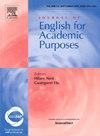超越沉默:探索EAP学生个性特征与大学课堂参与之间的关系
IF 3.4
1区 文学
Q1 EDUCATION & EDUCATIONAL RESEARCH
引用次数: 0
摘要
在对语言和身份的持续关注的背景下,本研究探讨了语言、人格特征和课堂参与度之间的相互作用。利用定位、投资和文化资本的理论概念,它试图了解完成EAP课程的国际学生如何在各种环境中导航他们的自我意识。来自苏格兰一所大学的国际研究生、EAP导师和学术讲师的观点和见解。半结构化访谈的数据使用扎根理论的策略进行分析,举例说明与社会建构主义框架相关的关键主题。研究结果表明,对互动式英国课堂的普遍期望可能会给来自不同教育背景的学习者带来挑战。这种环境可能也不适合那些喜欢独立工作和有时间在课堂上反思的人。教师们表现出一定程度的理解,为什么其他语言的使用者有时选择保持沉默,并试图避免负面标签。然而,对于什么是“有效的”参与,仍然存在一些潜在的假设。论文总结了对教育学和政策的启示,强调了重视不同个性和学习风格的包容性方法的必要性。通过重新评估沉默的解释,它有助于围绕“安静”学生的反叙事,这超越了基于赤字的方法。本文章由计算机程序翻译,如有差异,请以英文原文为准。
Beyond the silence: Exploring the nexus between EAP students’ personality traits and participation in university classrooms
Against a background of continuing interest in language and identity, this study examines the interplay between language, personality traits, and classroom engagement. Drawing on the theoretical concepts of positioning, investment, and cultural capital, it seeks to understand how international students who have completed an EAP programme navigate their sense of self in various settings. Perspectives and insights were gathered from international postgraduates, EAP tutors, and academic lecturers in a Scottish university. Data from semi-structured interviews were analysed using strategies from grounded theory, exemplifying key themes which connected to the social constructionist framework. Findings indicate that the prevailing expectations of interactive UK classrooms can present challenges for learners from diverse educational backgrounds. This type of environment may also be unsuited to those who prefer independent work and time to reflect in lessons. Instructors demonstrated a degree of understanding as to why users of other languages sometimes choose to remain quiet, and tried to avoid negative labelling. However, there were still underlying assumptions about what constitutes ‘valid’ participation. The paper concludes with implications for pedagogy and policy, underscoring the need for inclusive approaches which value different personalities and learning styles. By reassessing the interpretation of silence, it contributes to a counter-narrative around ‘quiet’ students which moves beyond deficit-based approaches.
求助全文
通过发布文献求助,成功后即可免费获取论文全文。
去求助
来源期刊

Journal of English for Academic Purposes
Multiple-
CiteScore
6.60
自引率
13.30%
发文量
81
审稿时长
57 days
期刊介绍:
The Journal of English for Academic Purposes provides a forum for the dissemination of information and views which enables practitioners of and researchers in EAP to keep current with developments in their field and to contribute to its continued updating. JEAP publishes articles, book reviews, conference reports, and academic exchanges in the linguistic, sociolinguistic and psycholinguistic description of English as it occurs in the contexts of academic study and scholarly exchange itself.
 求助内容:
求助内容: 应助结果提醒方式:
应助结果提醒方式:


